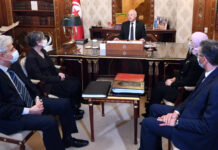In the following interview with the JDD Tunisia website, Alain Gresh, former editor-in-chief of Le Monde Diplomatic and founder of the online magazine Orient XXI, who specializes in the Israeli-Palestinian conflict, and the Middle East, answers us about Tunisia’s role in this conflict and the future of alliances.
We have recently seen Hamas spokesperson Sami Abu Zuhri warning Israel from Tunisia. We also remember an Israeli bombardment in Tunisia or the assassination of Mohamed Zouari, in Sfax, by the Mossad in 2016. Is Tunisia the rear base of the Israeli-Palestinian conflict?
In 1982 Bourguiba and the people welcomed the Palestinians whom the Israeli army had expelled from Lebanon. Although each Maghreb country has its own relations with Palestine, solidarity with the Palestinian people has a long history in Tunisia.
In August 2020, Tunisia was criticized for the late reaction of Kais Saied after the announcement of normalization of relations between Israel and Arab countries. Why?
Like any country that depends on international aid, it’s hard to imagine Tunisia opening a front against the United Arab Emirates. In 1982, it was easier for Bourguiba to act in favor of Palestine whereas today there is pressure from donors.
What has changed with the announcement of the normalization of relations between Morocco and Israel?
This announcement was a victory for Israel, as Morocco is an important country in the region and even on the continent. Even if Morocco already had relations with the Hebrew state, especially in terms of trade exchange. The normalization of relations with Israel by Morocco, the United Arab Emirates and Bahrain has broken the consensus of the Arab world on the recognition of a Palestinian state.
In Tunisia, a bill penalizing political or commercial relations with Israel was rejected in 2012. Can such a law, called for by Abdellatif Mekki today, ever be passed?
This is Tunisian domestic politics. We cannot ask Tunisia to sacrifice itself for the Palestinian cause, at the expense of its economy or its diplomatic relations. The daring stand taken by Tunisia, the condemnation of normalization with Israel and its support for the Palestinian people; this is what really matters today.
Conversely, can Tunisia stay on its line, when we see how Morocco has agreed to normalize its relations with Israel?
While Pressure from the United States and donors is strong, there is an obstacle to normalization between Tunisia and Israel: democracy. We note that normalization with Israel was announced by countries with authoritarian regimes. The United States has blackmailed Sudan by demanding recognition of Israel in exchange for the withdrawal of Sudan from its blacklist of countries supporting terrorism and they came to an understanding with the military to the detriment of the civilian wing of power . However, In Tunisia, with strong public support, it will be difficult for any president to normalize his relations with Israel which can only normalize its relations with dictatorships.
In the West, there is a tendency to equate the struggle for Palestine with anti-Semitism. Is Tunisia anti-Semitic?
This is a delicate question. In his book “The Arabs and the Shoah”, researcher Gilbert Achcar shows the evolution of anti-Semitic sentiment among Arabs. At times in history, there has been anti-Semitism, such as in 1967 with anti-Jewish riots in Tunisia and Morocco, yet that does not translate into attacks on the Jewish community any longer. The proof is that the annual “Ghriba” pilgrimage is generally going very well. Certainly, part of public opinion equates Jews with Israel, but it is Israel which, by its policies and its speeches – “we are the State of the Jews” – promotes this amalgamation and takes the Jews of the whole world hostage.
Are the latest events in Jerusalem going to change anything in relations between Israel and Arab countries?
We have seen demonstrations in Morocco, but it is hard to imagine the kingdom going back on its decision. The latest events have shown that the Israeli-Palestinian question remains central to the Arabs. Even Egypt has taken a tough stand against the Hebrew state. For Saudi Arabia and the Gulf countries, it will be more complicated to establish relations with Israel.











